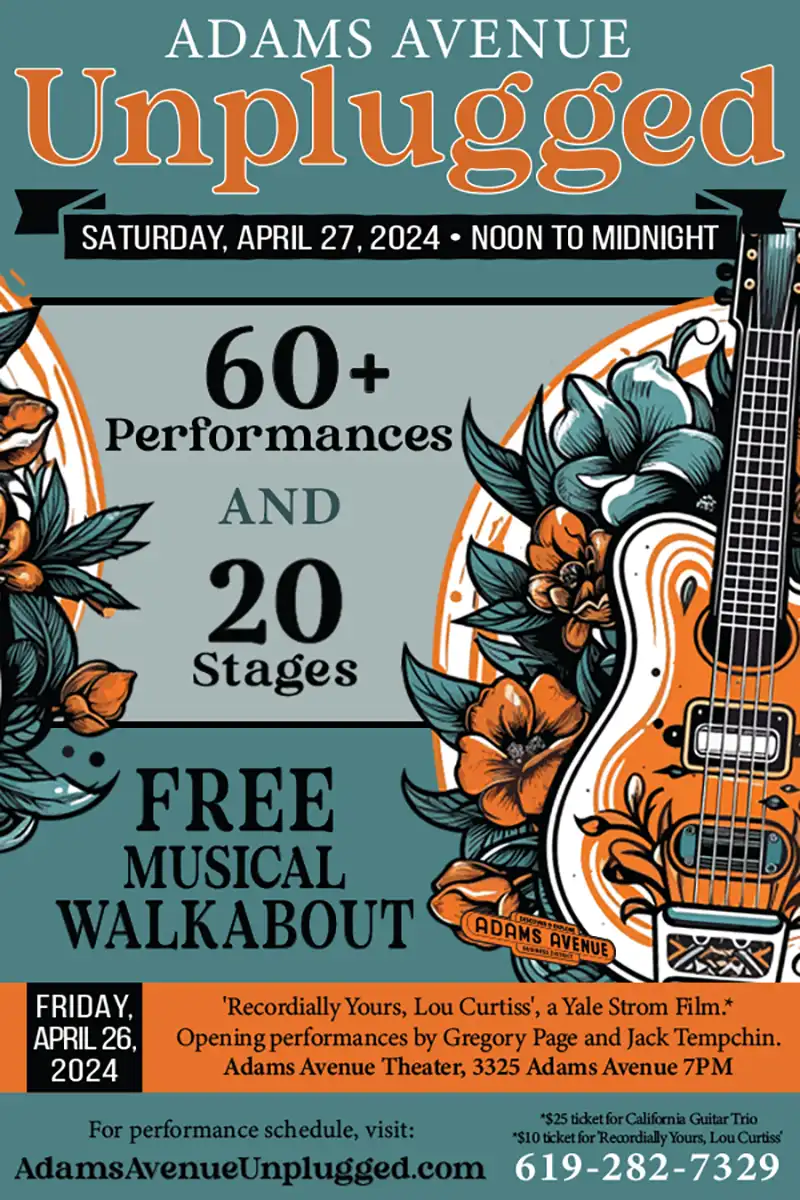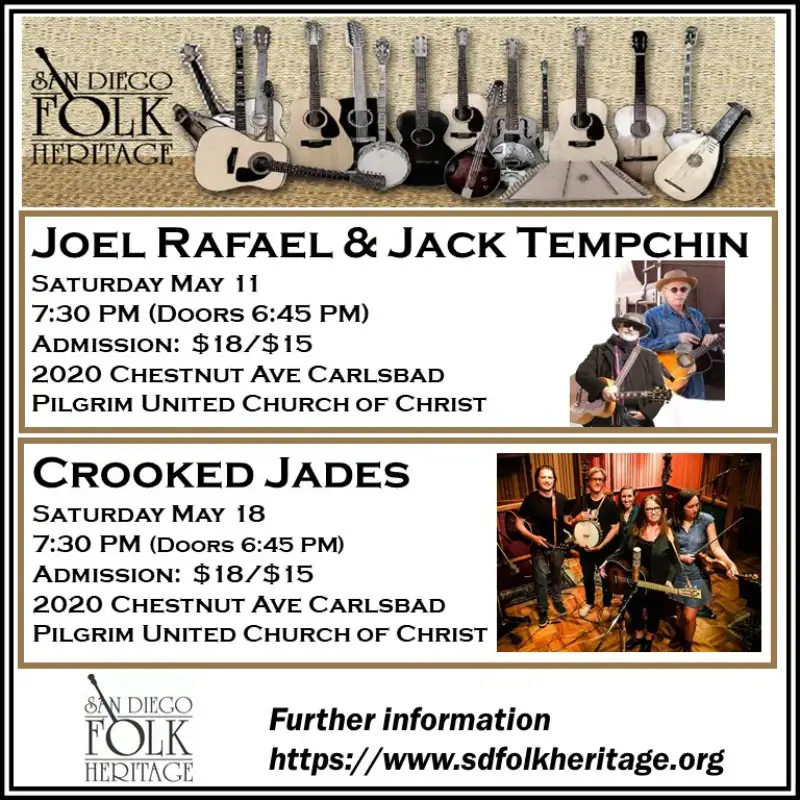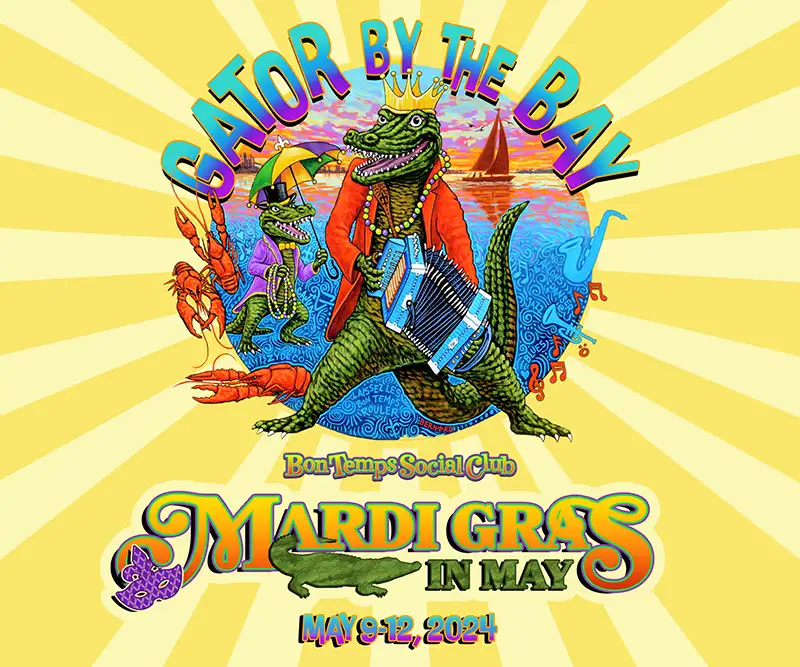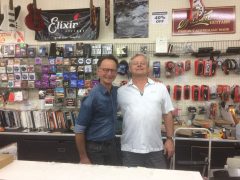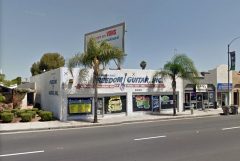Featured Stories
Freedom Guitar’s Farewell
Few instruments inspire the feeling of freedom the way the guitar always has. They can’t offer the versatility of an expressive voice you can carry around, play nearly any musical style on, learn and teach with relative ease, and create improvisation with so marvelously. It’s probably the reason why there are no stores called Freedom Piano, Freedom Drums, or Freedom Oboe. But Freedom Guitar–it rolls right off the tongue.
There have been Freedom Guitar stores here in San Diego for nearly as long as anyone can remember. Started by musicians turned businessmen from the Northwest in the early 1970s, these stores in downtown and the college area have long been a fixture in the local retail, repair, and vintage market for guitars and other instruments. The Freedom Guitar store chapter is 46 years old and will be coming to a close April 1. The story of this place is the story of the Bowen brothers, Dewey and Ves.
[We are] the sons of a musician who traveled constantly,” Ves recalled. “Starting with my dad, music has been in our family forever and always will be. Chase that dream–that’s what has really made our business, people chasing that dream, trying to really do something in the industry.”
“I started Freedom Guitar in 1970 with a couple of partners in Portland, Oregon,” recalled Dewey. “After a couple of years in business up there I decided to move to San Diego, where it was warmer. I moved down here in October 1972; at the time I had $125 and a ’62 Chevy station wagon full of guitars and amps. Showed up and rented a spot down at 425 Market Street between Fourth and Fifth. At that time Allison Ross was one of the newscasters in town, and her opening line was ‘from the shores of La Jolla to the seedy side of Market Street.’ That’s where we were, way before the Gaslamp District.
“My brother Sylvester [Ves] came down with me; he wasn’t part of the business in Portland, but he helped me move it down here. He and I became partners.” As children, they moved around a lot but graduated from Upland High School in California and went straight into business. The Bowens also have two other brothers, Edgar and Elton, who have worked with Ves and Dewey in the business over the years.
Ves is the more musically inclined of the brothers. As he observed, “Once a picker, always a picker.” He is married to local roots musician Nisha Catron, who plays in CalAmity with Cathryn Beeks. Dewey said. “I found myself that I could sell [guitars] better than I could play them.
“We were right in the right place and right time for the vintage guitar market. The guitars up to that time were cheap and nobody wanted used guitars, they wanted new instruments. We were happy to take the quality used ones in, we could tell that they were better than the ones currently being made. After a few years, we became the largest vintage dealers in Southern California.”
The business thrived, expanding during the ’70s and ’80s to eventually include four stores, including two in Los Angeles and a larger store on Eighth Avenue downtown. They kept the Market Street location for about 15 years and the other downtown store until around 2002, and have been at the current location at 6334 El Cajon Boulevard for 35 years.
Dewey noted, “During the ’90s, there were 11 music stores within a mile radius of here. All of them are gone; the only ones left are us and the Organ Stop. They’ve either gone out of business or, like Guitar Center and Moze, they moved to La Mesa. There used to be Apex, American Dream, us, Guitar Center, Guitar City, Organ Stop, Moze Guitar, and Music City.”
Vintage guitars are their specialty. What is vintage? Ask Ves.
“Before 1970, when they were still made by guitar companies and not mining companies. Norlin bought out Gibson in 1969 and began about a ten-year period when they lost a lot of their integrity in the marketplace and the quality went down. They were still quality compared to other companies but back in the day, they really made this stuff by hand and they were real craftsmen.
“The Gibsons, the Fenders, the Martins, those are the three major brands. Then, of course, you have the custom makers, what we refer to as the ‘Stradivaria’ makers: the De Angelicos, the Strombergs, the real master builders. They were mostly archtop guitars back before they had electricity and amplifiers. (Leo) Fender was probably the most ingenious person whom I hold in highest regard, because he was an engineer–he engineered a very simple design that has been popular since 1952.”
Dewey: “The best acoustic guitars have already been made. The newer ones, so much of it is done with C and C machines; there’s still a lot of hand workmanship that has to go into an instrument. So many synthetic materials are going into guitars nowadays. It used to be woods that were older, better woods that came from first growth forests.” Both noted the CITES treaties, environmental agreements that limit access to certain protected woods, like Brazilian rosewood, which affects sales of some old guitars.
The brothers were not only musicians and salesmen but they were also successful inventers.
“In the early ’80s, we had an invention called the Bowen Handle. It’s a retrofit vibrato unit for Gibson-style electric guitars,” said Dewey. “Marketing coincided with the coming out of Eddie Van Halen, and it was quite a hit. It was patented and we sold hundreds of thousands of them. It gave us enough wherewithal to buy the building on El Cajon Boulevard.” The handle is still available on the internet at various music supply sites.
Over the years Freedom Guitar has done business with many local musicians, as well as some more famous players, which have included Pete Townshend of the Who, Adrian Belew, Joe Walsh, Rick Nielsen of Cheap Trick, and David Lindley.
“They bought all kinds of interesting things. We sold two back line Showman Reverbs to Aerosmith’s Joe Perry just before the tour when Steven Tyler fell off the stage,” Dewey remembered. “Jackson Browne bought a steel guitar from us. Joe Satriani bought accessories, including straps and stuff. Leon Russell is kind of an interesting story. He comes in the shop, I thought the guy was a bum. I couldn’t figure him out, I kept looking at him, he was sort of snooping around and I thought he was going to steal something. And I thought ‘that guy looks kind of familiar.’ Then I realized he was Leon Russell. He bought accessories for a gig.”
What those luminaries and other customers found on the north side of El Cajon Boulevard in the Rolando area, where aging storefronts are giving way to five-deep condominiums, is a store that hugs the sidewalk tightly. Its windows sport watercolor-painted signs alerting passersby to bargains, and the stucco building has seen better days. Stepping inside, disarray seems to rule the day, but there is a comfortable informality of small business not seen in fancier corporate stores where the challenge is often to simply be waited on. Three walls of the main room are lined with hanging guitars, many minor treasures in the distance, behind an impressive foreground obstacle course of black PA speakers, soundboards and other back line equipment. Amps of every iteration and size are scattered everywhere, with stacks of drums five deep toward the rear of the room, which contains 11 mostly empty glass display cases in various arrangements that seem relics of previous floor plans. In one spot, 14 empty guitar cases rest against one another. The specialty here is guitars, but the back wall is strewn with hanging saxophones, trumpets, flutes, and other brass; turn a corner and you face a wall of violins. It’s a big store, with a keyboard room toward the back and a room with just acoustic guitars; the main glass counter is repaired with old industrial tape in one spot in front of a large display of guitar strings. There are rooms behind for repairs and stock. It is a big place, with plenty of clutter or, as Ves terms it, “chaos.” Virtually all of it is used equipment for serious musicians, and it looks the part: if you can’t find it, it either doesn’t exist, or you probably don’t need it.
There is a rumor of a decline in the market for guitars as the new century and new generation has seen music move away from guitars. Though large stores like Guitar Center have big inventories of cheap knockoffs of name guitars, many termed “toys” by Dewey, they are not doing well financially. Dewey isn’t sure that the collapse of the guitar market has really occurred.
“We know just what we hear in the news and what we hear in the magazines. The Chinese have flooded the market with subsidized instruments and guitar factories and are continuing to produce guitars by the tens and hundreds of thousands. And the population is still growing–there still is a market for vintage instruments. A lot of people who were into the instruments in the ’70s and ’80s, and ’90s are into their retirement years now, and a lot of these guitars are getting back into the market.”
The musical instrument business took a big hit in 2008 with the recession but has shown a recovery, and Freedom got into the web early, launching a website in the ’90s. Now they do a majority of their business on the internet, including import and shipping. Ves described shipping pallets of vintage gear each month to a dealer in Germany who is the largest vintage instrument dealer in that country. Despite their web success, Dewey pointed out, “Service is something you can’t do on the web, we do very little of it on the web. Still, we’ve been strong in service all these years.”
Closing the brick and mortar store will not mean total retirement for either brother. Ves plans to keep busy working from home with consignments; he is also a film maker.
“That’s where I’ll be. And still be pickin’. I’ve actually got my movie coming out called Cat: A Dog’s Tale. It has all of my music and my wife, Nisha Catron. We’ve been filming the movie for the last six or seven years. Interesting tale; I wrote it, directed it, filmed it, produced it. Did everything, except for my wife, who did a lot of the music. Got some of the local artists in the movie also with their music. Hopefully we’ll be able to get it out in public on Amazon by July 4.”
For Dewey, “You know, going out of retail, a storefront business is what we are going out of. I’m a contributor to Vintage Guitar Price Guide, a guitar dealer participant, placing prices on vintage instruments. I’ll probably continue having my own online store and do the vintage guitar shows nationally. Something I can turn on and off when I want to.”
Ves sums things up like this: “I’d like to thank everybody out there for the support they’ve given us all through the years. It’s kind of like it’s your baby, you know? You have this baby and you raised it, you nursed it, and now it’s like losing a member of the family. I know for me, I’ve been doing this for 46 years, and I’m hesitant to leave–but it’s just time. There’s a lot of issues: brick and mortar is kind of slow, the Internet is good, our age. It’s time.


